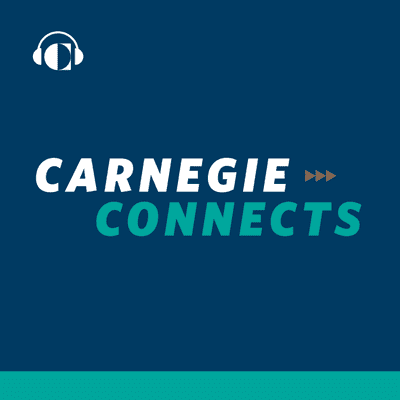
Carnegie Connects
Podcast de Carnegie Endowment for International Peace
Carnegie Connects is our premier virtual event series hosted by Aaron David Miller. Every other week, he tackles the most pressing foreign policy issues of the day in conversations with journalists, policymakers, historians, and experts.
Empieza 7 días de prueba
$99.00 / mes después de la prueba.Cancela cuando quieras.
Todos los episodios
84 episodiosWhile the Trump administration was eager to jettison the Obama-era Iran nuclear deal in its first term, it now seems serious about negotiating another agreement in its second. And Iran, though wary of that seriousness and fearful of U.S. military action, appears willing to give negotiations a chance. What are the prospects for success and the appetite for meaningful engagement with Iran? How would an agreement differ from the 2015 Iran nuclear deal? And if diplomacy fails, is American and Israeli military action against Iranian nuclear sites inevitable? Join Aaron David Miller as he engages Suzanne Maloney, the vice president and director of the Foreign Policy program at the Brookings Institution, and Vali Nasr, the Majid Khadduri Professor of International Affairs and Middle East Studies at the Johns Hopkins University School of Advanced International Studies, on these and other issues on the next Carnegie Connects.
Three months into his presidency, Donald Trump has embarked on an unprecedented effort to aggrandize executive power and extend his reach over the judiciary, Congress, the media, and even American culture and society. Perhaps the most alarming aspect has been his battle with the judiciary. The president has called for the impeachment of a federal judge; his executive orders have challenged, if not violated, constitutional norms; and his Justice Department has slow-walked, if not ignored, the rulings of the federal judiciary, including the Supreme Court. “Never in history has the country faced such a massive flood the zone strategy,” writes [https://www.foreignaffairs.com/united-states/how-survive-constitutional-crisis-save-democracy] the Carnegie Endowment’s President Mariano Florentino (Tino) Cuéllar in Foreign Affairs. Can the republic’s guardrails hold? Other than the courts, what are the constraints on the abuse of presidential power? What role do the markets, the states, the media, and public opinion play? And what are the consequences for America if these guardrails don’t hold? Join Aaron David Miller as he engages the Carnegie Endowment’s Tino Cuéllar and Harvard’s Learned Hand Professor of Law Jack Goldsmith to shed light on how these issues may play out and what their implications are for America’s changing place in the world on the next Carnegie Connects.
China is top of mind for all these days, including U.S. officials. Whether it's because of military exercises against Taiwan, a trade war with the United States, or China's efforts to block a deal on Tik Tok, getting tough on Beijing seems to be the order of the day. But are we getting China right? Are agreements between the United States and China on core interests possible? Or is the current status quo the best we can do with Beijing to manage the relationship to avoid serious conflict? Join Aaron David Miller as he sits down with the Economist’s David Rennie to discuss these and other issues.
In recent days, the Netanyahu government has doubled down on its efforts to consolidate its control and ramp up its military operations in Gaza and Lebanon. Following the firing of the former director of Shin Bet, an unprecedented decision in Israel’s history, the government has begun the more complicated process of terminating the attorney general, as well as changing the process by which judges are appointed. A ferocious military operation in Gaza that has taken a terrible toll on Palestinian civilians and recent anti-Hamas demonstrations have resulted in renewed negotiations on a new hostage release for ceasefire agreement. And for the first time since the Israeli-Hezbollah ceasefire agreement in November 2024, rockets launched against northern Israel triggered response strikes in the Beirut suburbs. What does the future hold for Gaza and any longer-term agreement? Will the Netanyahu government succeed in what appears to be a renewal of the 2023 effort to increase its power and undermine Israel’s judiciary? What about any hopes for a regional peace accord encompassing Palestinians and Saudi Arabia? Join Aaron David Miller as he engages former Shin Bet director Ami Ayalon on these and other issues on the next Carnegie Connects.
Does public opinion matter in the Israeli-Palestinian conflict? Do leaders pay attention to the changing views of their respective constituencies? Each situation presents unique challenges for analysts and scholars trying to answer these questions. And those challenges have grown exponentially more complicated in the wake of October 7, 2023, and the ongoing Israel-Hamas war. How have Israeli and Palestinian attitudes evolved toward their leaders and the region, one another, the United States’ role, and the war? And how do Israelis and Palestinians on all sides of the divide imagine their future, particularly whether there’s a pathway out of the ongoing crisis and any prospects for ending the Israeli-Palestinian conflict? Join Aaron David Miller as he engages in conversation with Dahlia Scheindlin, a political strategist and a public opinion researcher, and Khalil Shikaki, the director of the Palestinian Center for Policy and Survey Research, two analysts and pollsters of Israeli and Palestinian politics and public opinion, on these and other issues on the next Carnegie Connects.
Empieza 7 días de prueba
$99.00 / mes después de la prueba.Cancela cuando quieras.
Podcasts exclusivos
Sin anuncios
Podcast gratuitos
Audiolibros
20 horas / mes























